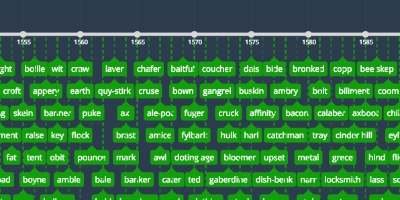1 Jan 1471 Jahr - grith
Beschreibung:
The word ‘grith’, often metathesised to ‘girth’, meant peace or guaranteed security, and a sanctuary seeker in Durham would rap at the knocker on the door of the Cathedral asking <i>gyrth for God’s sake</i> (SS64/72). In Yorkshire, both Beverley and Ripon had similar rights. Once safely within the church the sanctuary seeker was known as a ‘grithman’ or ‘girthman’ and a by-name provides an early example of the word: 1297 <i>Paulin Grithman</i>, Beverley (YRS16/151). In 1342 pardons were granted <i>ad omnes homines vocatas grithmen</i> if they agreed to fight the Scots (SS74/80). Both spellings occur in fifteenth-century records: 1458 <i>confugæ sive gyrthmanij</i>, Ripon (SS64/72); 1460 <i>nullus Grithmannus ejusdem ville</i>, Beverley (BTD51). Within Ripon church was a stone called the grithstone: 1228 <i>et infra portam cimiterij et locum qui vocatur Grythstane</i>, Ripon (SS74/51): in an earlier undated reference it was <i>the stane that Grythstole hatte</i>;that is ‘is named’(SS74/90). The sanctuary seekers were ministered to by a ‘grithpriest’: 1392 <i>in tenura domini Johannis vocati le Grithpreste</i>, Ripon (SS81/105). In 1471 John Eksmyth, <i>gyrthman</i> of Ripon, sought permission to carry the<i> gyrthrod</i> which was apparently a stave with a banner, borne by the grithmen at Rogation-tide (SS64/383). Byland Abbey charters of 1240 and 1246 refer to a liberty which granted them freedom from payment in cases of <i>grithbreche</i> or <i>grithbreke</i>. These are alternative spellings of a term which is explained as ‘the breaking of the king’s peace’ (SS208/190,198). Stones which marked where sanctuary ended were placed on the outskirts of Beverley and some of these have survived.Zugefügt zum Band der Zeit:
Datum:
1 Jan 1471 Jahr
Jetzt
~ 554 years ago
